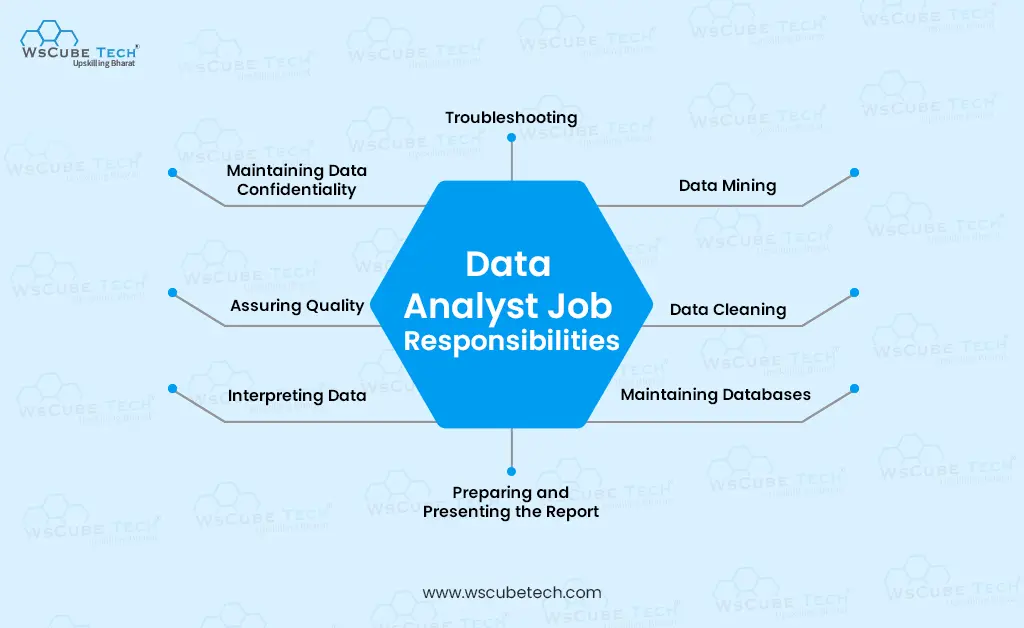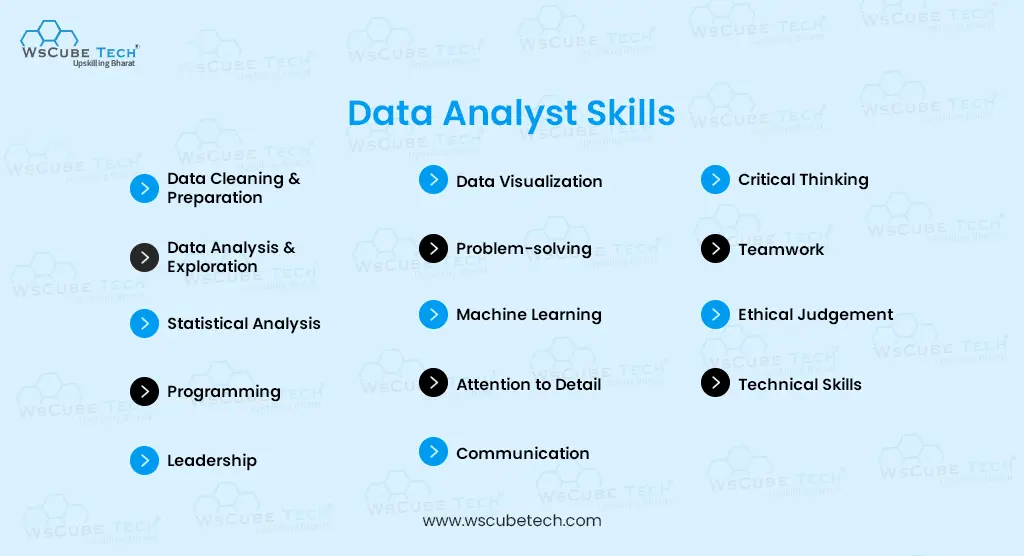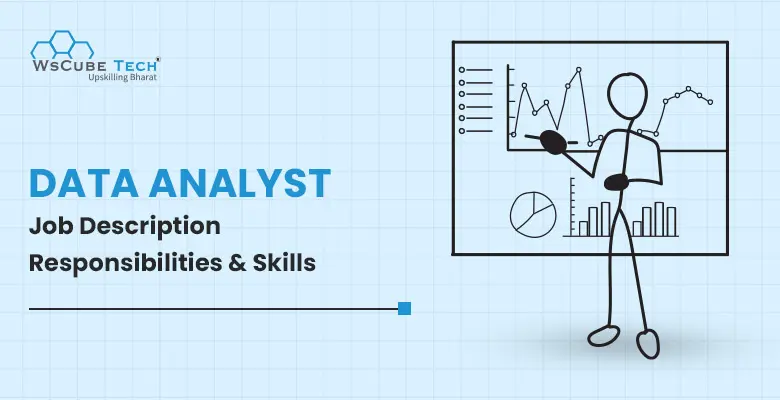Companies and businesses rely highly on data to make important decisions related to products, marketing, investments, and target customers. Organizations also use data to identify their strengths and weak areas. No wonder that data analytics is one of the most sought-after skills worldwide.
Organizations look for skilled and proficient data analysts who can handle their projects and provide meaningful insights. A knowledgeable and expert data analyst can provide great value to a company by interpreting different types of data and presenting it to stakeholders in a way that they can understand easily.
A professional data analyst must possess a few key skills, including collecting, interpreting, manipulating, and analyzing data.
If you aspire to be a successful data analyst, you need to understand the duties and responsibilities of this job role. You must be familiar with the job description of data analyst before you prepare for the interview.
This article discusses the required skills, duties, qualifications, and other details of this job role. Have a look.
What Is Data Analysis?
Data analysis is the process of analyzing, manipulating, interpreting, and representing data using different methods and tools. Data analysts use different tools and approaches to uncover key insights to make informed decisions.
In simple terms, data analysis involves transforming raw data into meaningful information, statistics, and explanations to enable better decisions. There are five iterative phases in data analysis:
- Determine the relevant data to analyze
- Gather data
- Clean data
- Analyze data
- Interpret the results
What Does a Data Analyst Do?
Every technology or device that we are using is generating tons of data. According to an estimate, the total data generated worldwide every day is 2.5 quintillion bytes. Companies use this data to generate value worth billions of dollars. However, they need professionals to handle and manipulate this data. Hence, they hire data analysts who gather and analyze raw data and turn it into meaningful insights to solve specific business problems.
They go through multiple sources to extract relevant data, so they must possess exceptional research, analytical, and reporting skills. They perform extensive research, prepare reports, and share them with the management.
The data analytics job profile also includes communicating critical information to stakeholders and management through reports and presentations. Their results and findings help companies establish their targets, design marketing campaigns, identify areas that need improvements, and determine new products or services they can launch.
Data analysts can choose to work for different industries, such as finance, medicine, criminal justice, and government. Depending on the industry, their duties and responsibilities can vary.

Data Analyst Job Description 2025
Data analysts are primarily responsible for organizing data regarding market research, sales, logistics, and more. Using their expertise, they make sure that the data is accurate. They design, analyze, and present data in a way that enables stakeholders, businesses, and clients to make informed decisions. The following points are included in a data analyst work description:
- Data analysis to evaluate the quality and meaning of data.
- Keep track of global, national, and local trends that can affect the industry and business.
- Use advanced tools and technologies to collect data from multiple sources.
- Use different statistical tools to recognize, analyze, and interpret patterns in complex data sets for further diagnosis and prediction.
- Develop and maintain databases and convert data into a readable format.
- Collaborate with programmers, team leads, engineers, and other team members to identify opportunities to enhance the process, propose modifications in the system, and create data governance strategies.
- Remove errors and corrupted data and fix flaws.
- Clean data by reviewing reports and performance indicators to determine code issues.
- Assign values to key business functions so businesses can compare their performances over different time periods.
- Prepare reports for stakeholders and management stating patterns, trends, and predictions.
- Prepare and present final analysis reports that help stakeholders understand data-analysis steps and make informed decisions based on facts and trends.
- Exploratory Data Analysis Project, or EDA, is also a part of the data analyst post description. Professionals scrutinize data to identify patterns and use data modeling techniques to summarize features of data analysis.
Also read: Data Analyst Salary in India 2025 (Freshers & Experienced)
Data Analyst Job Responsibilities

Data analysts are responsible for gathering and interpreting data to solve a specific business problem. They spend plenty of time with data, including manipulating data and communicating their findings. Here are a few day-to-day job responsibilities for data analyst:
1. Data Mining
Data analysts collect data from different sources, be it primary or secondary. They extract data through surveys, tracking user behavior on a company’s website, and using data sets available on the internet. Once they have the required data, they organize it in a proper format that any person can easily understand.
2. Data Cleaning
Raw data may contain several duplicates, errors, missing values, redundancy, or outliers. Therefore, data analysts need to clean and maintain quality data by using different types programming languages to resolve errors, identify relevant data, and remove irrelevant information. This prepares data for manipulation and visualization. It also ensures that their interpretations are not wrong or skewed.
3. Maintaining Databases
Data analyst duties also include designing and maintaining database systems, where they take care of creating, updating, reading, and deleting databases. They can choose the data type to collect and store, decide how data categories are related, and establish how the data will appear.
4. Interpreting Data
This task involves finding patterns or trends in data to answer questions and solve specific problems.
5. Assuring Quality
Businesses rely heavily on data for their day-to-day pursuits. Thus, it is important to extract quality data that can enhance the productivity of the organization. Data analysts ensure that the data collected from multiple sources is relevant to the business.
Also read: Data Analytics Course Syllabus 2025
6. Maintaining Data Confidentiality
Data is a vital resource for any business, and they must maintain utmost security to keep crucial information secure and protected. It is one of the primary parts of a senior data analyst job description.
7. Preparing and Presenting the Report
Getting insightful information is not enough. Data analysts need to communicate the results of their findings to stakeholders. Therefore, preparing reports is a key part of their job. The reports may contain charts and graphs representing factors associated with the business. These reports help track business growth by evaluating primary factors, such as market analysis, profitability, and internal activities.
8. Collaborating with Teams
Data analysts work with other teams of ML engineers, data scientists, and software developers. They coordinate with different departments and team members to convey necessary information.
9. Troubleshooting
Troubleshooting is also a part of data analyst responsibilities and duties, which include resolving issues related to reports, information, and databases.
Essential Data Analyst Skills Set

A data analyst must possess a mix of technical, analytical, and soft skills that help them analyze data and communicate results effectively.
1. Data Cleaning and Preparation
A data analyst is responsible for cleaning and preparing data for detailed analysis. This skill includes identifying outliers, removing errors, and transforming data into a format that’s easy to analyze.
2. Data Analysis and Exploration
This skill involves the ability to find, collect, organize, and interpret different types of data and present that data effectively so that everyone can understand. Also, professionals must be able to analyze and explore data for insights using statistical methods.
3. Statistical Analysis
Data analysts must also be familiar with the concepts behind tools that help interpret and manipulate data. They should have a strong knowledge of statistics and math to determine which tools can solve a specific problem, help identify errors in the data, and understand the results. Furthermore, the field also demands an understanding of mean, median, variance, correlation, standard deviation, regression, and hypothesis testing.
4. Programming
Knowledge of programming languages, such as Python and R, helps you handle large data sets and solve complex equations. Python libraries, such as Numpy, Pandas, and Scikit-learn, are essential for data manipulation and analysis. Moreover, R is a powerful language used for statistical analysis and data visualization. Hence, you will find these languages in every data analytics job description.
5. Leadership
Data analysts often lead projects and handle a team, so they must possess strong leadership skills and confidence to make informed decisions. They must look and act professionally, especially while presenting data-related findings to stakeholders.
Also read: Top10 Best Big Data Analytics Tools & Software
6. Data Visualization
Data analysts must know how to present their findings clearly and compellingly to be successful in the field. They should master the skill of presenting crucial information through charts and graphs in a way that their employers, colleagues, and stakeholders can easily understand. Hence, job roles for data analysts also include data visualization and a fair understanding of libraries, such as Tableau, Excel, Notebook, Matplotlib, Power BI, etc., to present data in a visual format.
7. Problem-solving
This skill requires professionals to solve business problems using data-driven approaches. Data analysts must work on a project with a problem-solving mindset to efficiently identify current and potential issues and come up with viable solutions.
8. Machine Learning
Machine learning is becoming increasingly important for data analysis as it allows professionals to automate tasks, recognize patterns, and make predictions.
9. Attention to Detail
This skill refers to paying attention to every single detail, no matter how small it is, to ensure accuracy and recognize every error.
10. Communication
One of the crucial data analysts skills needed is communication. It includes both written and verbal communication skills to convey findings to non-technical stakeholders. Also, it involves creating reports and presentations to give insightful information.
11. Critical Thinking
This skill focuses on the ability to approach an issue logically and make data-driven decisions.
12. Teamwork
As data analysts work with a team to formulate data interpretations and come up with an actionable plan to improve results, they must be able to collaborate with their colleagues efficiently. They should understand the requirements of their team members, provide relevant data insights, and complete the project seamlessly.
Also read: Cyber Security vs Data Science: Which is Better for Career
13. Ethical Judgement
Data analysts must also be aware of the ethical implications of data storage, usage, and analysis to ensure data privacy and security,.
14. Technical Skills
Data analysts skills set must include technical know-how as they work with different advanced technologies. They must know how to use different software and tools to find and interpret data, organize databases, and track data sets. A few common programming languages that data analysts use are Python and SQL.

Qualifications of a Data Analyst
If you want to be a successful data analyst, just technical experience won’t be enough. Companies also check your qualifications and academic background to ensure you are fit for the role. Here are a few eligibility criteria for data analysts:
- Undergraduate degree in an analytical and statistical subject, such as economics, statistics, or mathematics.
- Postgraduate degree or any skill-based certification.
- Experience with database, model design, and segmentation techniques.
- Knowledge of software engineering methods.
- Technical writing experience in the relevant area, including writing reports, queries, and presentations.
- Practical knowledge of Python and R.
- Three or more years of experience as a data analyst.
FAQs on Data Analyst Job Description
Data analysts collect, process, and analyze data to help organizations make informed decisions. Daily tasks include cleaning and organizing data, creating visualizations, and generating insights to support business objectives.
Yes, data analysts often participate in data collection processes. They may collaborate with teams to define data needs, design data collection methods, and ensure data accuracy and completeness.
Key skills include proficiency in data analysis tools (e.g., SQL, Python, R), statistical knowledge, data visualization, attention to detail, and effective communication to convey insights to non-technical stakeholders.
Data analysts play a crucial role by providing actionable insights derived from data analysis. They help organizations understand trends, identify opportunities, and make data-driven decisions to achieve strategic goals.
While not always mandatory, programming skills (such as Python or R) enhance a data analyst’s ability to manipulate and analyze data efficiently. Familiarity with coding languages can be a valuable asset in the role.
Data analysts often collaborate with cross-functional teams. While they may work independently on data analysis tasks, effective communication and collaboration are essential for sharing findings and aligning with business goals.
Data analysts are in demand across various industries, including finance, healthcare, e-commerce, and technology. Virtually any sector that values data-driven decision-making can benefit from the skills of a data analyst.
Data analysts adhere to data protection regulations and implement best practices to ensure the confidentiality and integrity of data. This includes using secure data storage methods and applying anonymization techniques when necessary.
Yes, many data analysts transition to roles such as data scientist or business intelligence analyst. Continuous learning and skill development allow data analysts to explore diverse opportunities within the broader data science landscape.
Career progression for data analysts may include roles like senior data analyst, data scientist, or data engineer. Professional development through certifications and acquiring advanced skills often paves the way for career growth.
Conclusion:
The role of a data analyst is dynamic, requiring a blend of technical expertise, analytical prowess, and effective communication. As organizations increasingly embrace data-driven decision-making, the demand for skilled data analysts continues to surge.
From deciphering complex datasets to collaborating across diverse teams, a data analyst’s contributions are pivotal. Continuous learning, adaptability, and a commitment to staying abreast of industry trends are key to thriving in this ever-evolving field.
Whether you’re aspiring to enter the realm of data analysis or seeking insights into advancing your career, embracing the multifaceted responsibilities of a data analyst opens doors to a world driven by actionable intelligence and informed decision-making.
Read more blogs



